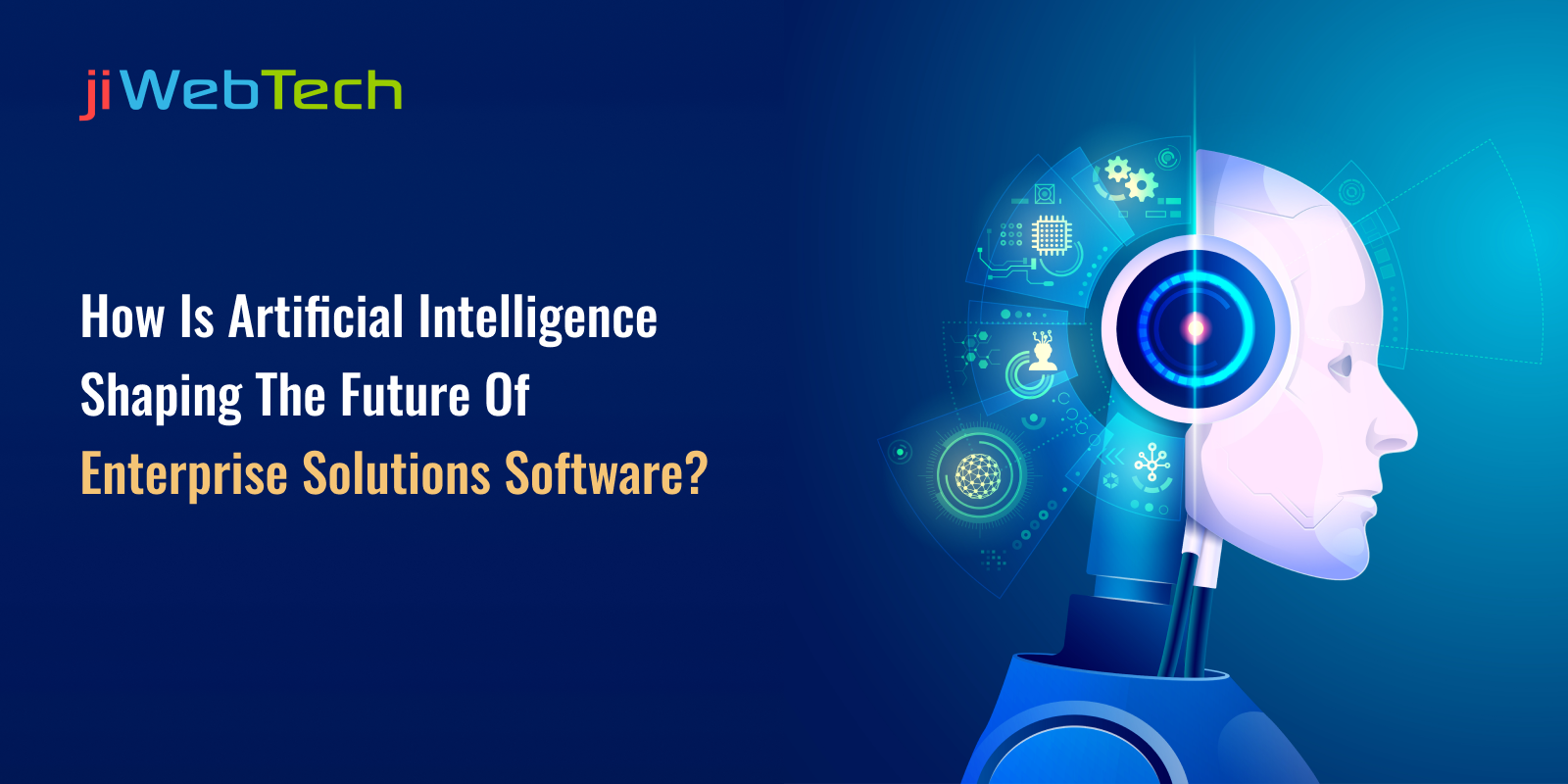- Nov 26, 2024
- Enterprise
- 2773
Share this post on:

Times are changing, and enterprise businesses are facing tough competition. Advanced technology is constantly shaping the world; lately, artificial intelligence has become the first choice of businesses. AI has created a huge shift in the working strategies of businesses, enhancing their productivity.
According to a survey, 86% of companies are planning to incorporate AI in their operations. More than 93% of employers and 86% of workers expect to use GenAI to help with boring tasks, boost creativity and innovation, and support more learning in the next five years.
Artificial intelligence refers to the simulation of human intelligence in machines programmed to think and learn like humans. In the context of enterprise solutions software, AI encompasses various technologies, including machine learning, natural language processing (NLP), predictive analytics, and robotics. These technologies enable software to analyze vast amounts of data, automate routine tasks, and provide actionable insights that drive business success.
The Role of AI in Enhancing Operational Efficiency
Let us discuss the role of AI in business and discover how AI is changing the businesses:
Automation of Routine Tasks: One of the most significant advantages of AI in enterprise solutions is its ability to automate repetitive tasks. By leveraging AI-driven automation tools, businesses can streamline operations and reduce manual errors. For instance, robotic process automation (RPA) can handle routine data entry tasks, freeing up employees to focus on more strategic activities. This shift not only enhances productivity but also improves employee satisfaction by allowing them to engage in more meaningful work.
Predictive Analytics for Informed Decision-Making: AI's predictive capabilities are transforming decision-making processes within organizations. By analyzing historical data and identifying patterns, AI can forecast future trends and outcomes. For example, businesses can use predictive analytics to anticipate customer behavior, optimize inventory levels, and manage supply chain logistics more effectively. This data-driven approach enables organizations to make informed decisions that align with market demands and operational capabilities.
Streamlining Resource Allocation: AI also plays a crucial role in optimizing resource allocation. By analyzing data related to resource usage and demand fluctuations, AI systems can recommend optimal resource distribution strategies. This capability is particularly beneficial in industries such as manufacturing and logistics, where efficient resource management is critical for maintaining competitiveness.
Enhancing Customer Engagement Through AI
Let’s move forward in the article and learn how AI is enhancing customer engagement.
Personalized Customer Experiences: AI-driven solutions are enabling businesses to deliver highly personalized customer experiences. By analyzing customer data—such as purchasing history, preferences, and behavior—AI algorithms can tailor marketing messages and product recommendations to individual customers. This level of personalization not only enhances customer satisfaction but also fosters loyalty and repeat business.
Intelligent Virtual Assistants: Intelligent virtual assistants powered by AI are becoming increasingly prevalent in customer service operations. These chatbots can handle a wide range of inquiries—from answering frequently asked questions to assisting with complex transactions—24/7. By providing instant responses and support, AI-driven assistants improve customer engagement while reducing the workload on human agents.
Sentiment Analysis for Improved Interactions: AI's natural language processing capabilities enable businesses to conduct sentiment analysis on customer interactions. By understanding customer emotions expressed through text or speech, companies can tailor their responses accordingly. This insight allows businesses to address customer concerns proactively and enhance overall satisfaction.
Data-Driven Strategic Insights: AI empowers organizations to make data-driven decisions in their strategic planning processes. Traditional planning often relies on intuition or outdated information; however, AI provides real-time insights into market conditions, competitor activities, and emerging trends. This capability allows business leaders to set realistic goals based on accurate data rather than assumptions.
Risk Management through Predictive Modeling: AI's ability to analyze historical data helps organizations identify potential risks before they materialize. By employing predictive modeling techniques, businesses can assess the likelihood of various risks—such as supply chain disruptions or market fluctuations—and develop contingency plans accordingly. This proactive approach minimizes potential losses and enhances organizational resilience.
The Future Landscape of AI in Enterprise Solutions
Let us shed some light on the future of AI in enterprise solutions.
Integration with Cloud-Based Systems: The integration of AI with cloud-based enterprise resource planning (ERP) systems is a significant trend shaping the future of enterprise solutions software. Cloud-based ERP systems provide scalability and flexibility while enabling real-time data access across departments. By incorporating AI capabilities into these systems, organizations can enhance their operational efficiency further by leveraging advanced analytics and automation tools.
Emergence of Generative AI: Generative AI represents a new frontier in artificial intelligence that focuses on creating content rather than merely analyzing existing data. This technology has vast implications for enterprise solutions software by enabling businesses to automate creative processes such as content generation for marketing campaigns or product design innovations. Generative AI can help organizations stay ahead of the competition by facilitating rapid innovation cycles.
Challenges and Considerations
While the benefits of integrating AI into enterprise solutions are substantial, several challenges must be addressed:
Data Privacy Concerns: As organizations increasingly rely on data-driven insights from AI systems, ensuring data privacy becomes paramount. Companies must implement robust security measures to protect sensitive information while complying with regulations such as GDPR.
Skill Gap in Workforce: The rapid adoption of AI technologies necessitates a workforce equipped with the necessary skills to leverage these tools effectively. Organizations may face challenges in finding talent proficient in AI technologies or may need to invest in training existing employees.
Ethical Implications: The deployment of AI raises ethical considerations regarding bias in algorithms and decision-making processes. Organizations must prioritize transparency and fairness when implementing AI systems to build trust among stakeholders.
Conclusion
Artificial intelligence is reshaping the future of enterprise solutions software by enhancing operational efficiency, improving customer engagement, and transforming strategic planning processes. As businesses continue to embrace these technologies, they will unlock new opportunities for growth and innovation. As we look ahead, it is clear that the synergy between artificial intelligence and enterprise solutions will continue to drive significant advancements across industries—ultimately leading us toward a more efficient and innovative future.
In this rapidly evolving landscape, jiWebtech is at the forefront of integrating AI into enterprise solutions. By leveraging advanced technologies tailored to meet specific business needs, jiWebtech helps organizations navigate the complexities of digital transformation while maximizing their potential for success. Contact us to learn more.
Frequently Asked Questions
What is Artificial Intelligence (AI) in the Context of Enterprise Solutions Software?
AI in enterprise solutions refers to the integration of intelligent technologies such as machine learning, natural language processing, and predictive analytics into software systems that help businesses manage their operations more efficiently. This includes automating tasks, analyzing large datasets, and providing insights for decision-making.
How is AI transforming Enterprise Resource Planning (ERP) systems?
AI is revolutionizing ERP systems by enhancing data analysis capabilities, automating routine tasks, and improving forecasting models. For instance, AI can analyze historical data to predict future trends in supply chain management, helping companies optimize inventory levels and reduce costs.
What are some specific applications of AI in enterprise solutions?
AI is being utilized in various areas within enterprise solutions, including:
• Customer Service: Chatbots and virtual assistants handle customer inquiries, improving response times and customer satisfaction.
• Data Analysis: AI algorithms analyze complex datasets to identify patterns and trends that inform strategic planning.
• Predictive Analytics: Businesses use AI to forecast demand, manage inventory, and mitigate risks based on historical data.
• Human Resources: AI streamlines recruitment processes by analyzing candidate data and improving workforce management.
What benefits does AI offer to businesses using enterprise solutions?
The integration of AI into enterprise solutions provides numerous benefits:
• Increased Efficiency: Automation of repetitive tasks allows employees to focus on more strategic activities.
• Enhanced Decision-Making: AI-driven insights enable better strategic planning and operational decisions.
• Personalized User Experience: AI can tailor interactions based on user behavior, improving overall user satisfaction.
• Cost Reduction: By optimizing processes and reducing manual errors, AI helps lower operational costs.
Are there any challenges associated with implementing AI in enterprise solutions?
Yes, several challenges may arise when integrating AI into enterprise solutions:
• Data Security and Privacy: The use of AI increases the risk of data breaches; businesses must implement robust security measures.
• Skill Gap: There is a need for specialized skills in data science and machine learning to effectively utilize AI technologies.
• Integration Complexity: Merging AI capabilities with existing systems can be complex and time-consuming, requiring careful planning.
What is the future outlook for AI in enterprise solutions?
The future of AI in enterprise solutions looks promising. The global market for AI-enabled software is expected to grow significantly, with projections indicating that the market could reach $126 billion by 2025. Companies are increasingly adopting AI technologies to enhance operational efficiency and maintain a competitive edge in their industries. As advancements continue, we can expect even more innovative applications of AI across various sectors.
How can businesses prepare for the integration of AI into their operations?
To effectively integrate AI into their operations, businesses should:
• Invest in training their workforce to bridge the skill gap.
• Develop a clear strategy for implementing AI technologies.
• Ensure robust data security measures are in place.
• Start small with pilot projects before scaling up their AI initiatives.
By taking these steps, organizations can better position themselves to leverage the benefits of AI in their enterprise solutions.









